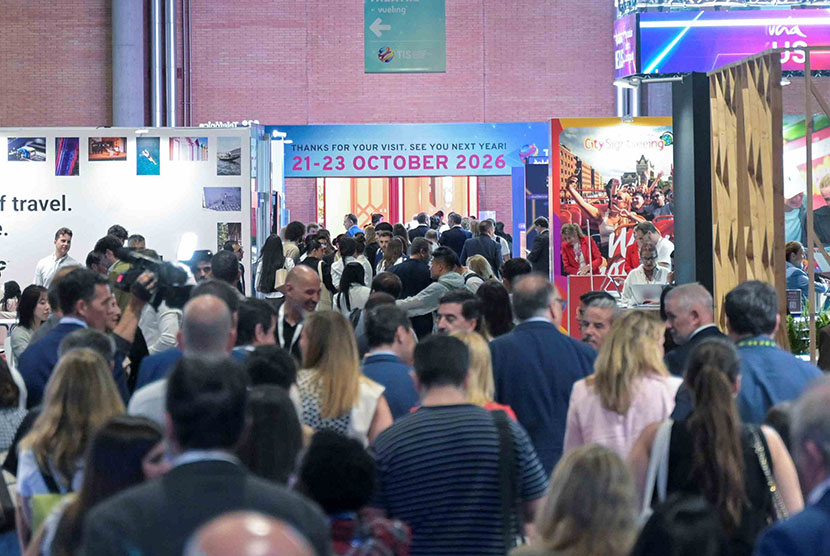Published on
October 27, 2025
By: Tuhin Sarkar

The AI revolution is transforming the tourism industry, and Tourism Innovation Summit 2025 in Seville has emerged as the epicenter of this futuristic shift. Over three dynamic days, Seville showcased the immense potential of AI in reshaping how we travel, plan, and experience tourism. The summit revealed groundbreaking innovations, with AI at the forefront, promising a more personalized, efficient, and sustainable future for the entire industry. As Seville became the global hub for AI-driven tourism, it’s clear that the Tourism Innovation Summit 2025 is the event that will define the next era of travel. Keep reading to discover how.
The Tourism Innovation Summit 2025 in Seville, Spain, has successfully concluded its sixth edition, bringing together 8,197 attendees for three exciting days of learning, networking, and innovation. This year’s focus was on artificial intelligence (AI) and its transformative impact on the tourism industry. With 239 exhibiting companies and 407 global experts, TIS2025 provided invaluable insights into AI’s role in shaping the future of travel events. Seville once again proved itself as the epicentre of global tourism innovation, with AI driving the conversation about a more sustainable and personalised travel experience.
The Success of TIS2025 in Seville
The Tourism Innovation Summit 2025 set a new milestone in the tourism industry, with its largest ever attendance. Over the course of three days, Seville became the heart of tourism events, drawing 8,197 professionals from around the world. Hosted in the vibrant city of Seville, Spain, this event redefined how the tourism and technology sectors collaborate to push boundaries and create a more sustainable, data-driven future. With over 239 exhibiting companies, TIS2025 showcased a wealth of innovative solutions, from AI-driven systems to Big Data applications, all designed to enhance the way we travel. Seville, with its rich cultural history and innovation-focused environment, was the perfect backdrop for such a pioneering event.
The summit attracted 27 country delegations, making it a truly international event. Notably, South Korea was the Destination Partner, highlighting the growing importance of cross-border partnerships in advancing tourism innovation. The economic impact of TIS2025 on Seville was a staggering €22 million, further solidifying its position as a leading hub for tourism events globally.
AI Takes Centre Stage at TIS2025
A central theme at TIS2025 was the role of artificial intelligence in reshaping the tourism industry. David Hurtado, Innovation Lead at Microsoft, stole the spotlight with his presentation on generative AI. Hurtado explained how this form of AI is not just about processing data, but enhancing human abilities by making decisions and engaging in cognitive reasoning. “We are talking about augmenting ourselves, not replacing ourselves,” Hurtado stated, emphasising the potential of AI to empower both businesses and customers in the tourism sector. He elaborated on how AI could automate routine tasks, enhance workflows, and provide data-driven insights for better decision-making. Hurtado also showcased the power of AI in analysing complex data, particularly in tourism trends, illustrating its potential in driving the future of travel events.
This was just one of the many discussions at TIS2025, which brought AI to the forefront of tourism innovation. The summit highlighted the importance of data-driven personalization strategies and the potential of AI to offer bespoke travel experiences that cater to individual preferences. It’s clear that AI is not just a buzzword; it’s the key to unlocking a new era of sustainable, personalized tourism experiences
Generative AI and the Future of Tourism Technology
At the heart of TIS2025 was the conversation about the potential of generative AI. Joshua Ryan-Saha, Director of Traveltech at the Edinburgh Futures Institute, also contributed significantly to the AI discussion. He focused on both the challenges and opportunities AI presents in the tourism sector. Ryan-Saha pointed out that while AI can interpret text, images, audio, and code, it still faces significant challenges, particularly in operational and logistical data. According to Ryan-Saha, AI must overcome issues such as insufficient or inaccurate data to truly revolutionize itinerary creation and travel option searches.
Ryan-Saha stressed that the future of AI in tourism depends on building systems that are equally user-friendly for both humans and technology. AI will need to become more intuitive and capable of seamlessly integrating with current tourism platforms to ensure effective use. Moving forward, he sees a future where trust in AI systems will be paramount, and AI-driven automation will play a key role in simplifying the travel booking process.
Sustainability and Innovation: A Dual Focus at TIS2025
Sustainability was another major theme discussed during TIS2025, with experts agreeing that technology will be essential to achieving sustainable tourism. Speakers emphasised the need to adopt sustainability-oriented technologies that minimize the environmental impact of tourism while enhancing the traveller’s experience. It was clear from the discussions that all stakeholders, from governments to businesses, need to prioritise sustainability in order to secure the future of the tourism industry.
AI and other digital solutions will play a pivotal role in making tourism more sustainable. By reducing operational costs and enhancing resource management, tourism companies can lower their carbon footprints while still providing high-quality experiences for travellers. As sustainability continues to be a key driver of the tourism industry, the technologies showcased at TIS2025 are set to change how tourism companies operate and how travellers experience destinations.
AI-Powered Personalisation: The Next Big Thing in Travel
The demand for personalised travel experiences is higher than ever, and TIS2025 showed that AI is the solution to this growing trend. By leveraging Big Data and AI, tourism businesses can offer highly customized recommendations that are tailored to each traveller’s unique preferences. From customised itineraries to real-time updates on local events and activities, AI will enable businesses to offer a more personal, seamless travel experience.
Generative AI allows companies to engage with travellers in ways that were not possible before. It can suggest experiences based on previous trips, predict preferences, and even automate responses to customer inquiries, all of which create a smoother, more engaging journey for the traveller. As AI continues to evolve, we can expect even more intelligent systems that will allow for an even higher level of personalisation.
TIS2025’s Impact on the Future of Tourism
The Tourism Innovation Summit 2025 was a pivotal event in the global tourism calendar, offering valuable insights into the future of the industry. With AI, Big Data, and sustainability leading the charge, TIS2025 set the stage for the next generation of tourism technology. As the summit showcased, AI is not just a tool for enhancing customer experiences; it is a driving force for business innovation, operational efficiency, and sustainability in tourism.
With Seville, Spain, hosting such a transformative event, it’s clear that the city is quickly becoming a global hub for tourism innovation. The discussions at TIS2025 will shape the tourism sector for years to come, providing businesses with the tools and strategies needed to stay ahead of the curve. As the world of travel continues to evolve, the role of AI will only become more crucial in creating better, more sustainable travel experiences.
The Tourism Innovation Summit 2025 in Seville has left an indelible mark on the tourism industry. By highlighting the power of AI, Big Data, and sustainability, TIS2025 has shown that the future of tourism lies in innovation and technology. As the event concluded with 8,197 attendees and expert insights from 407 global leaders, it’s clear that AI will continue to drive the evolution of travel events and the tourism industry as a whole. Seville has once again demonstrated its importance as the epicentre of tourism innovation, offering a glimpse into the future of travel.



